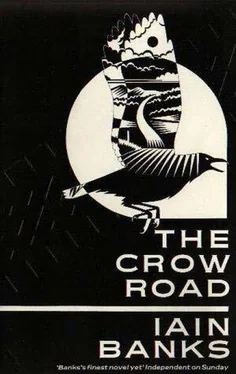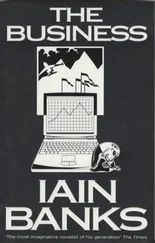Iain Banks - The Crow Road
Здесь есть возможность читать онлайн «Iain Banks - The Crow Road» весь текст электронной книги совершенно бесплатно (целиком полную версию без сокращений). В некоторых случаях можно слушать аудио, скачать через торрент в формате fb2 и присутствует краткое содержание. Год выпуска: 1992, Жанр: Современная проза, на английском языке. Описание произведения, (предисловие) а так же отзывы посетителей доступны на портале библиотеки ЛибКат.
- Название:The Crow Road
- Автор:
- Жанр:
- Год:1992
- ISBN:нет данных
- Рейтинг книги:5 / 5. Голосов: 1
-
Избранное:Добавить в избранное
- Отзывы:
-
Ваша оценка:
- 100
- 1
- 2
- 3
- 4
- 5
The Crow Road: краткое содержание, описание и аннотация
Предлагаем к чтению аннотацию, описание, краткое содержание или предисловие (зависит от того, что написал сам автор книги «The Crow Road»). Если вы не нашли необходимую информацию о книге — напишите в комментариях, мы постараемся отыскать её.
The Crow Road — читать онлайн бесплатно полную книгу (весь текст) целиком
Ниже представлен текст книги, разбитый по страницам. Система сохранения места последней прочитанной страницы, позволяет с удобством читать онлайн бесплатно книгу «The Crow Road», без необходимости каждый раз заново искать на чём Вы остановились. Поставьте закладку, и сможете в любой момент перейти на страницу, на которой закончили чтение.
Интервал:
Закладка:
"How's your wizard?" I asked her.
"Eh?" Ash looked confused for a moment. "Oh; Doctor Gonzo? Still working on the files. They weren't just weird shit, they were corrupted weird shit; where did your dad keep those things; inside a TV? But anyway; he's still hopeful."
"Doctor Gonzo?" I said, tartly.
"Don't look like that, Prentice," Ash chided. "This guy's knocking his pan in for you for nothing. And he has got a doctorate."
I smiled. "Sorry."
"Oh, and supposing the good Doctor can decipher all that corrupted crap you presented him with, what format do you want these files in eventually anyway, you ungrateful wretch?"
"How d'you mean?"
"I mean what program do you use on the Compaq?"
"Oh, Wordstar," I nodded knowledgeably.
"Version? Number?"
"Ah… I'll have to come back to you on that one. Look; just ask him to print it out and send it to me. Would that be okay?"
She shrugged. "If you want. Or you could get a modem; E-mail's about a zillion times faster."
"Look, I'm still not all that comfortable around computers that don't come with a joystick and a 'fire' button; just… just ordinary airmail and real paper will be fine."
Ash grinned, shook her head. "As you wish." She stood up. "Same again?" she asked, clinking my glass.
"No," I said. "I'll have a half."
"Any particular sort?"
"Na, anything."
I was alternating pints and whiskies on principle; they keep giving you your old glass back down here.
I watched Ash weave her way to the bar.
I still felt nervous about meeting this guy Paxton-Marr, but all-in-all, I told myself, things weren't so bad. Those of us most affected by dad's death were — with the possible exception of Uncle Hamish — bearing up pretty well, I might yet find out what Uncle Rory had written, I didn't have to worry about money, I had no criminal record, and I was being a good young(ish) adult again, attending diligently to my studies. Mostly I stayed in Glasgow during the week, and went back to Lochgair at weekends, unless mum — sometimes accompanied by James — came to stay with me. I had got filthy drunk just once since dad had died, and then with good reason; it had been the day Thatcher resigned. Bliss was it, etc., even if the Tapeworm Party was still in power.
The lawyer Blawke had found me a place to rent for the year I needed to be in Glasgow. It was part of the property of a Mrs Ippot, who'd died rich but intestate at a sourly ripe old age, having throughout her life promised part, or all, of her sizeable fortune to various individual relations and combinations of relations within her extensively and antagonistically divided family, in a blizzard of contradictory letters, and with what appeared to be a profound lack of consideration for the litigious chaos that was bound to ensue. Mrs Ippot, in short, had been the sort of client probate lawyers have wet dreams about.
My own theory was that Mrs I had actually thoroughly detested every single one of her relatives, and had hit on a nicely appropriate way of confounding all of them. By Jarndyce out of Petard, Mrs Ippot's lawyer-infested legacy had ensured that her rebarbatively consistent family would suffer years if not decades of self-inflicted hatred and frustration as the increasing legal fees gradually corroded the monies she had left; a tortuously slow method of telling your relatives from beyond the grave exactly what you thought of them that makes giving all the loot to a cats" home look positively benign in comparison.
And so I stayed in the late Mrs Ippot's enormous town house in Park Terrace, overlooking Kelvingrove Park and the River Kelvin running through it. The museum and art gallery sat red, huge and stately to the left, its sandstone bulk crammed with the silt of time and human effort, while on the hill to its right, skirted by the black outlines of trees, the university soared with self-impressed Victorian fussiness into the grey autumnal skies, positively exuding half a millennium's experience in the collation and dissemination of knowledge.
The high ceilings and vast windows of Mrs Ippot's former home appeared to have been the work of an architect anticipating the design of aircraft hangars; the interior was cluttered with paintings, rugs, chandeliers, life-sized ceramics of the smaller big cats, small statues, large statues and objets d'art of every imaginable description, all interspersed with heavy, dark, intricately gnarled wooden furniture that gave the appearance of being volcanic in origin. The house's inventory — drawn grimly to my attention by a spotty clerk who obviously resented the fact I was younger than he was — came in three volumes.
I christened the place Xanadu, but never did find any sleds.
My friends, of whom I saw less these days, suggested parties when they first heard about the place. On seeing it, they usually agreed with me that to mount a serious whoopee on the premises would be to invite cultural catastrophe on a scale usually only witnessed during major wars and James Last concerts.
One of my pals — graduated, employed; moving on to better things — sold me his old VW Golf, and I drove down to Lochgair most weekends, usually on a Thursday night as I didn't have any classes on a Friday. James and I helped mum, who was redecorating the house. She was talking about knocking down the old conservatory and putting in a new one, perhaps covering a small swimming pool. She had also formed the idea of building a harpsichord, and then learning to play it. We took tea at the Steam Packet Hotel on occasion, and James kept an Ordnance Survey map on which he inked in all the walks we undertook, on the hills and through the forests around Gallanach.
Mum and I had started going through dad's diaries. Some were pocket size, some were desk diaries; a couple of early ones were effectively home made. They went back to when he'd been sixteen. I'd suggested Mum read them first in case there was anything embarrassing in them, though I think in the end she just skimmed them. They weren't the stuff of scandal, anyway; the entries we'd sampled when we first discovered them in the box at the back of the cupboard were about as revealing as they ever got; really just appointments, notes on what had happened that day, where dad had been, who he'd met. If there was a single indiscretion recorded there, I never found it. The same went for any but the most basic observation or idea; he'd kept those in the A4 pads.
It was at the bottom of the box containing dad's diaries, in an old presentation tin which had held a bottle of fifteen-year-old Laphroaig, that I found Rory's diaries; little pocket books, usually a week-per-two-pages. Dad must have filed them separately from the other papers.
I got very excited at first, but then discovered that Rory's diaries were even more sparse — and considerably more cryptic — than my father's, with too many initials and acronyms to be easily understood, and too full of week — and even month-long gaps to form a reliable impression of Rory's life. There was no diary for the year he disappeared. I'd tried to make sense of Rory's diaries, but it was uphill work. The entry for the day of my birth (when Rory had been in London) read:
K r; boy 8£. Prentis?!? M ok Eve, pub.
The entry for the next day read: 'vho' in shaky writing, and that was all. 'ho' and 'vho' (or sometimes h.o. and v.h.o.) often followed entries regarding pubs or parties the night before, and I strongly suspected they stood for hungover and very hungover. K meant Kenneth and M Mary, pretty obviously, ok was itself (its opposite was nsg, which stood for Not So Good; he'd spelled it out the first time he'd used it, following a 48hr h.o. after Hogmanay the previous year). A small r meant 'rang'; a telephone call. And I had indeed weighed in at eight pounds.
I found a few mentions of 'CR' — I even recognised some of the notes I'd read the previous year; he must have jotted them down in his diary first before transferring them to his other papers. But there was nothing to provide any new answers.
Читать дальшеИнтервал:
Закладка:
Похожие книги на «The Crow Road»
Представляем Вашему вниманию похожие книги на «The Crow Road» списком для выбора. Мы отобрали схожую по названию и смыслу литературу в надежде предоставить читателям больше вариантов отыскать новые, интересные, ещё непрочитанные произведения.
Обсуждение, отзывы о книге «The Crow Road» и просто собственные мнения читателей. Оставьте ваши комментарии, напишите, что Вы думаете о произведении, его смысле или главных героях. Укажите что конкретно понравилось, а что нет, и почему Вы так считаете.












